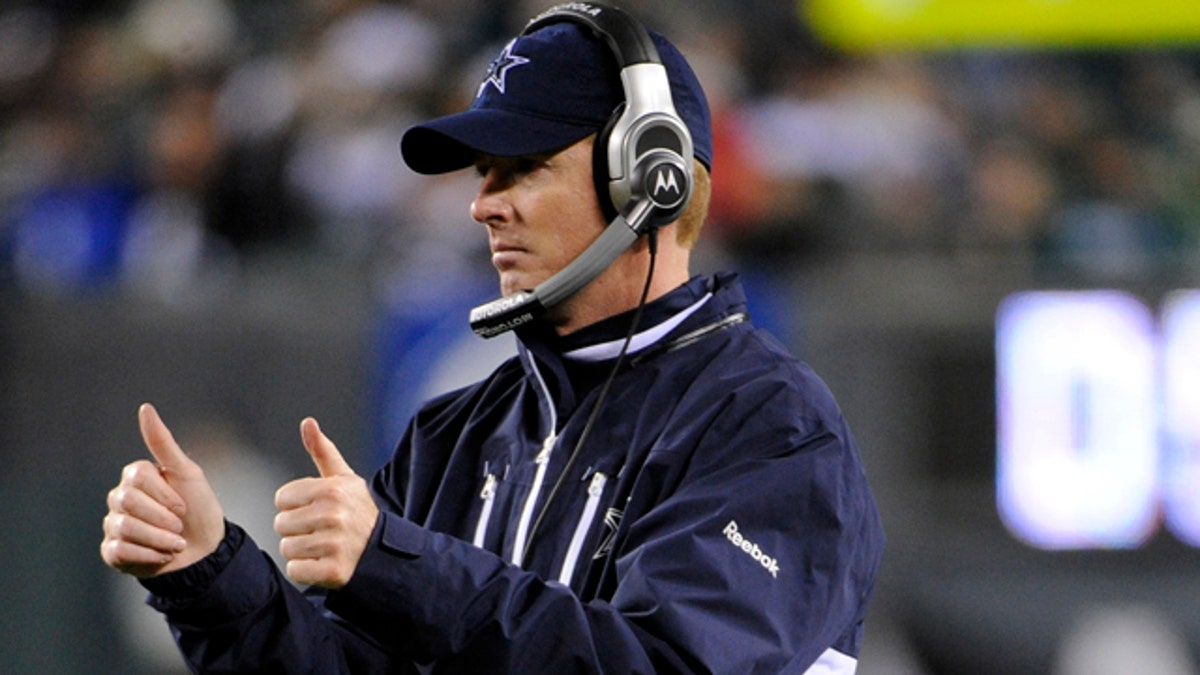
Jan. 2: Dallas Cowboys interim head coach Jason Garrett reacts after a touchdown by tight end Jason Witten in the second half of an NFL football game against the Philadelphia Eagles in Philadelphia. (AP)
IRVING, Texas -- Jason Garrett nailed his audition. He gets to remain coach of the Dallas Cowboys.
Owner Jerry Jones took the interim label off Garrett on Thursday and made him -- officially -- the eighth head coach in the history of this proud franchise. He's the first head coach who also played for the Cowboys, as he was a backup to Troy Aikman in the 1990s.
"He's truly one of our own," Jones said during a news conference at Cowboys Stadium. "We know him well for the qualifications he has for this position. I know that he has spent his entire life preparing for this day. And he is well-qualified."
Garrett made the choice easy for Jones by going 5-3 during his half-season in charge. He took over a club that had been 1-7 and was asked to merely make them competitive. He not only compiled a winning record, but his losses were by a total of seven points.
Having seen what Garrett could do, Jones didn't even interview him. He considered receivers coach Ray Sherman and Miami assistant head coach Todd Bowles, who could still join the staff as defensive coordinator.
"I was fortunate to be on teams here in the '90s that went to the top of the National Football League," Garrett said. "I understand how those teams played. I like to refer to it as the Cowboy way."
The Cowboys needed new leadership when a season that began with legitimate aspirations of becoming the first team to play in the Super Bowl at their home stadium went rotten. Jones fired Wade Phillips at midseason and turned to Garrett, the 44-year-old assistant head coach and one of the highest-paid assistants in the league.
The deck seemed stacked against him. The team was coming off consecutive blowout losses, playoff hopes were gone and quarterback Tony Romo was out with a season-ending injury. It also was Garrett's first time as a head coach on any level. And, as offensive coordinator, he was partly to blame for the mess.
But the Princeton grad had spent years preparing for the opportunity and knew exactly what he wanted to do.
He started the workday earlier, added hitting to midweek practices, required players to jog between drills and cracked down on rules, including ones he added. He had huge digital clocks installed around the locker room to avoid any excuses about being late to a meeting.
He was constantly upbeat.
The Cowboys responded, cutting down on turnovers and penalties, and began forcing other teams into mistakes. They won four games with 38-year-old backup quarterback Jon Kitna and another with third-stringer Stephen McGee making his first start.
Jones believes the Cowboys have enough key players in place to bounce back quickly. Despite the lousy record, Dallas had five players make the Pro Bowl, most from any team.
Garrett will have a say in who stays and who goes, including the coaches. The defense is especially likely to be overhauled after allowing the most points and yards in franchise history. Jones remains committed to a 3-4 alignment.
The NFL labor uncertainty and possibility of a lost season played into Jones' decision. Whenever players return -- as scheduled this offseason, or whenever a new collective-bargaining agreement is done -- they already will be familiar with Garrett. Starting over could slow the turnaround Jones expects.
Garrett is well aware of the challenges and pressures of this job, one of the most high-profile in pro sports. He's spent 12 years with the organization as a player or coach. His brothers John and Judd also are part of the organization, and his father, Jim, was with the club more than 20 years, working for every head coach in team history except Phillips.
Garrett's coaching background includes working with many top offensive minds, including Norv Turner and Sean Payton. He's also consulted with his first coach with the Cowboys, Jimmy Johnson.
Dallas has appeared in a record eight Super Bowls and won five. However, the club is in the midst of its longest drought -- 15 years since reaching the big game, and counting. Dallas has won just two playoff games since its last championship, in 1996 and 2009.
Jones can't afford any more bad seasons because he needs to sell seats, suites -- and perhaps naming rights -- for the team's $1.2 billion stadium that opened last season.
